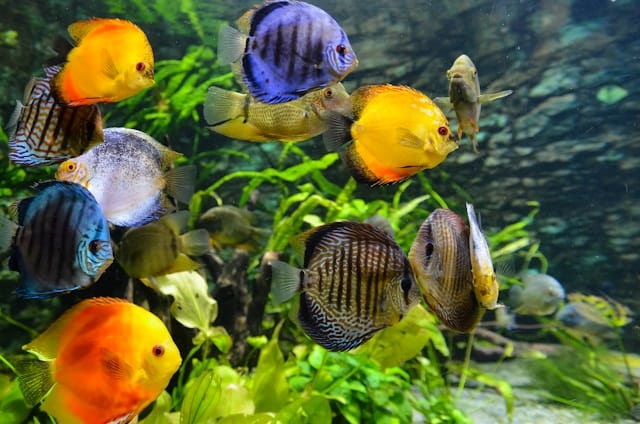Keeping a discus fish tank is a rewarding hobby for many, but it requires diligent care and attention. One critical aspect of discus fish keeping is monitoring and maintaining ideal water parameters, crucial for the health and well-being of these temperamental aquatic pets. This article will explore essential parameters like temperature, pH levels, hardness, and ammonia, among others. We will also provide practical tips on how to maintain these conditions and keep your discus fish healthy and happy.
Water Quality: The Lifeline of Your Discus Fish
Water quality is fundamental to the survival and well-being of your discus fish. Poor quality water can cause illness and stress, reducing the lifespan of your finned friends. Here, we will examine key elements of water quality, including ammonia, nitrite, nitrate levels, and discuss how to keep them all in check.
Lire également : What Are the Best Strategies for Treating Separation Anxiety in Siamese Cats?
Ammonia, Nitrite, and Nitrate Levels
High ammonia levels can be fatal for your discus fish. Ammonia toxicity, indicated by reddening gills and lethargy, is a common issue in aquariums and one that requires immediate attention. You should aim to keep ammonia levels at 0 ppm (parts per million) to ensure your fish remain healthy.
Nitrite is another harmful chemical for discus fish. Similar to ammonia, nitrite levels should also be kept at 0 ppm. Regular water changes can help maintain these levels.
Sujet a lire : How to Care for a Dog’s Skin and Coat During Harsh Winter Months?
Nitrates are less harmful than ammonia and nitrites, but high levels can still cause health issues for your discus fish. Try to maintain nitrate levels below 50 ppm in your aquarium.
Water Changes: The Pillar of Good Quality Water
Performing regular water changes is paramount to controlling harmful chemicals and maintaining good water quality. Replace around 25% of your tank water weekly to keep ammonia, nitrite, and nitrate levels well managed.
Tap water often contains chlorine and other chemicals harmful to discus fish. Using a water conditioner during each change can help neutralize these chemicals and ensure your tap water is safe for your fish.
Temperature: Maintaining Stable Warmth
Discus fish are tropical creatures and require warm water to thrive. In this section, we will explore the importance of temperature in a discus aquarium and how to maintain stable levels.
The Ideal Temperature for Discus Fish
Discus fish thrive in temperatures around 82-88 degrees Fahrenheit (28-31 degrees Celsius). Such high temperatures aid their metabolism, promoting active behavior and healthy growth.
Temperature fluctuations can stress your discus fish, leading to diminished immune responses and susceptibility to disease. Therefore, maintaining a stable temperature is essential.
Using a reliable aquarium heater with a thermostat can help manage the temperature. Additionally, a thermometer is a must-have to monitor and confirm the temperature regularly.
Water Hardness and pH Levels: Finding the Balance
The water hardness and pH levels in your discus aquarium are other important parameters to monitor. Let’s delve into how to manage these conditions appropriately.
Water Hardness: Soft is Better
Discus fish prefer soft water. Water hardness is usually measured in degrees of hardness (dH) or ppm. Aim to keep the water hardness between 3-15 dH or 50-200 ppm for optimal health of your discus.
pH Levels: Slightly Acidic to Neutral
The pH level refers to the acidity or alkalinity of your water. Discus fish prefer slightly acidic to neutral water, meaning a pH between 6.0 and 7.0.
Testing your water’s pH level is a straightforward task using a pH test kit. If the pH is too high, peat moss or driftwood can be added to the aquarium to lower it.
Monitoring: Keep an Eye on Your Tank
Monitoring your tank conditions regularly is vital to prevent problems before they become too severe. We will now look at ways to test your water parameters and keep your tank in check.
Use a Water Testing Kit
Invest in a good quality water testing kit. Such kits contain tests for ammonia, nitrite, nitrate, pH, and often hardness and alkalinity. They are easy to use and provide quick results.
Regular Check-Ups
Make a schedule to test your water at least once a week. More frequent testing may be required if you notice any changes in your discus behavior, or after adding new fish to the tank.
Keep a Log
Maintaining a log of your water parameters can be helpful. Look for patterns or sudden changes in the readings, which might suggest an issue with your tank’s water quality.
Remember, taking care of discus fish is a labor of love that requires attention and consistency. However, the vibrant colors and graceful movements of these beautiful fish make it all worthwhile. By carefully monitoring and maintaining the water parameters in your discus tank, you can provide a healthy and stimulating environment for your aquatic pets.
Regular Maintenance: A Must for Discus Fish Care
In addition to monitoring, regular maintenance of your discus fish tank is crucial. Remember, it’s not just about keeping optimal water conditions but also about providing an overall healthy environment for your discus. This section will discuss the importance of regular tank cleaning, the role of filtration, and the value of a well-balanced diet.
Tank Cleaning: Not Just a Chore
Cleaning your fish tank might seem like a tedious task, but it is an essential part of discus fish care. Algae or food residue can start to build up over time, affecting the overall water quality. Regular tank cleaning helps prevent such build-up and helps maintain optimal water conditions for your discus.
Cleaning should be done with care. Use a soft sponge or brush to avoid scratching the tank glass. Remember not to use any soap or detergents as they can be harmful to your discus fish.
Filtration: Aiding in Water Quality
A good filtration system is a valuable asset for maintaining optimal water conditions in your discus aquarium. The filter helps remove waste products, improves oxygenation, and can help control harmful chemicals such as ammonia, nitrite, and nitrate.
There are various types of filters available, including mechanical, biological, and chemical filters. Choosing the right one depends on your tank size, the number of fish, and specific water conditions.
A Balanced Diet: Food for Health
Diet plays a vital role in the health and well-being of your discus fish. A well-balanced diet not only keeps your fish healthy but also helps maintain water quality. Overfeeding can lead to excess waste, impacting the water parameters negatively.
Feed your discus high-quality, nutrient-rich food, but remember to limit the quantity to what they can consume within a few minutes. Regularly vary their diet to include a mix of dry, frozen, and live foods for optimal fish care.
Conclusion: Consistency is Key
Sustaining a discus fish tank requires time, effort, and above all, consistency. Regular monitoring of water parameters and water changes, maintaining a stable water temperature, balancing water hardness and pH levels, and performing routine maintenance are all part of the process.
Remember, sudden changes can stress your discus fish and lead to health issues. Therefore, aim for gradual and consistent adjustments over time.
Invest in good quality testing kits and filtration systems, and feed your discus a balanced diet. These steps will go a long way in keeping your fish healthy and prolonging their lifespan.
Keeping a discus tank is indeed a labor of love, but the reward of watching these colorful, elegant creatures thrive in a healthy environment is truly worth the effort. So, embrace the journey of discus fish care, and in return, enjoy the beautiful, vibrant life that fills your aquarium.






